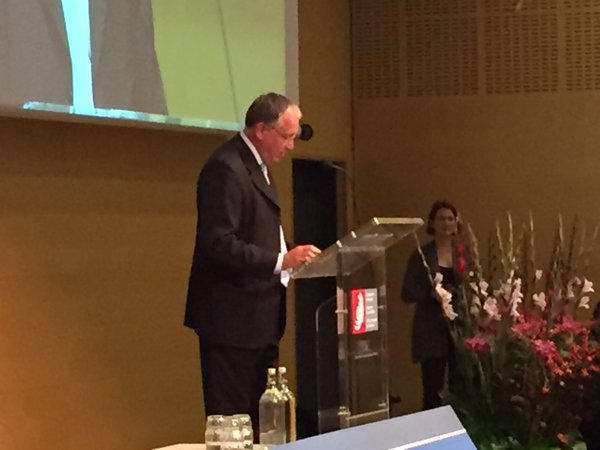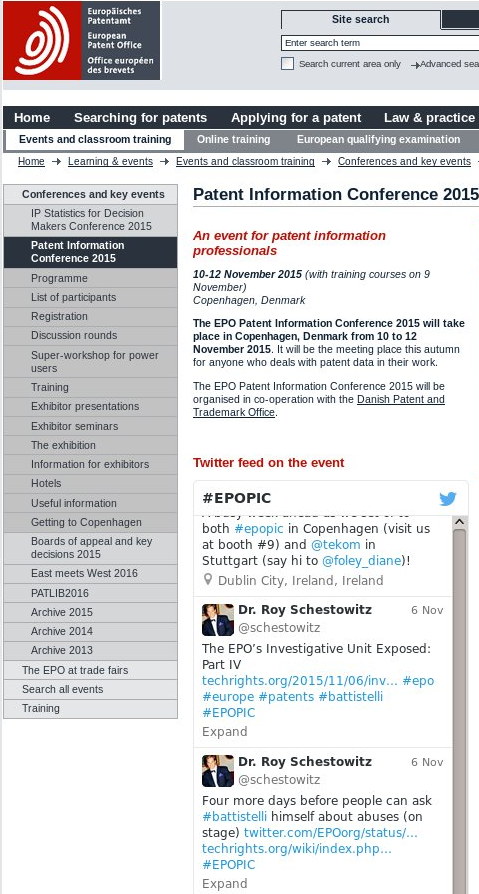

Benoît Battistelli at EPOPIC, photo via Otto Scharff
THE first day of the 25th EPOPIC (the EPO's own vanity platform) is definitely over and the keynote talks of Battistelli and Kongstad have been documented, to some degree, online (we don't know yet if videos too will surface or have already surfaced). To Kongstad's great convenience, it took place in Copenhagen, Denmark. According to the EPO's official Twitter account, "~400 participants from over 45 countries" attended this event.
"Given the increasing abundance of patents on life and software patents in Europe, how can these two people boast quality?"Quoting Battistelli, based on this: "We may be the best patent office when it comes to quality, but we are also the most expensive" (it was the best patent office before Battistelli came in perhaps, if not Brimelow too).
Jesper Kongstad too is quoted or paraphrased as saying: "Quality is at the centre of our minds when it comes to examination and searching activities" (every patent office would say this).
Given the increasing abundance of patents on life and software patents in Europe, how can these two people boast quality? It's under their management that the quality is being so rapidly compromised.
Battistelli is quoted (or paraphrased) by his PR/communication people as saying that EPO has "been able to significantly increase our efficiency & quality. This year we expect ~12% increase in our production" (production of what? This isn't production, it's the granting of monopolies).
"Battistelli wishes to just increase the number of patents, irrespective/regardless of quality."Using production line terminology, Battistelli shows just how misguided his strategy really is. Battistelli wishes to just increase the number of patents, irrespective/regardless of quality. Unless society somehow (overnight of over the course of a year) became 12% more innovative, the only way to interpret these numbers, efficiency aside, is that it became easier to pass quality tests (diminished quality control can be the result of overworked and rushed staff). In other words, the threshold for acceptance was lowered at the EPO. In the USPTO it's estimated that 92% of applications are "successful" and the overall number of patents is huge. It's not even manageable. Is this what Battistelli gradually mimics? Is this a yardstick for "success"?
The current management is lowering the quality and cheapening the value of patents (not cost) while fast-tracking massive amounts of patents for large, aggressive corporations like Microsoft. With increased pressure on staff, don't expect examiners to properly examine prior art. It's becoming a rubber-stamping operation, influenced by or run at the behest of large corporations.
Battistelli is paraphrased as saying: "The Unitary Patent is a huge improvement of the European patent system and facilitates access mainly for the SMEs" (again ironic if not outright foolish a statement, putting aside his unacceptable intervention in politics).
Based on leaked documents, SMEs are discriminated against. Kongstad, who is close to Battistelli (this has been the cause for protests by much of the staff), has done nothing to end this. He won't even assist outside/independent investigations. According to this, Jesper Kongstad said that "big players on the market have understood that we need to suport [sic] SMEs to benefit from the IP assets."
"It's not not all that lucrative for patent examiners (not in the long terms) and definitely not for European citizens, even small European businesses."Well, obviously then they're doing something wrong when they create a fast track/lane for larger (and better off) corporations, even non-European ones. This hurts SMEs the most.
"Our patent information system is focused on: quality, completeness, usability, timeliness and correctness," the EPO paraphrases Battistelli.
Well, that's just not correct; not anymore, for sure.
Make no mistake. Battistelli still has fans like IP Australia (patent lawyers), to whom patent maximalism must seem like a business opportunity (more applications for more clients means more income for them). It's not not all that lucrative for patent examiners (not in the long terms) and definitely not for European citizens, even small European businesses.
Finally, a lesson for EPO Webmasters: if you are going to display embedded content from Twitter, make sure it's guaranteed to be under your control, not Twitter's control. The screenshot below is from the EPO's own Web site. It's just a shame that these links would be blocked if clicked from within the EPO... ⬆
